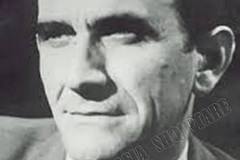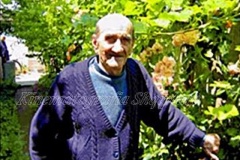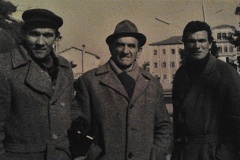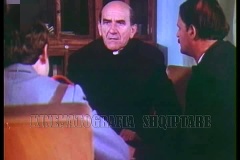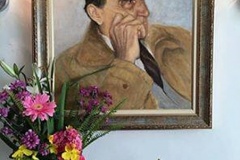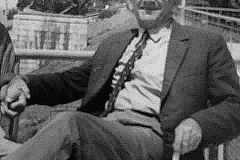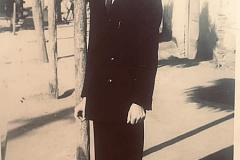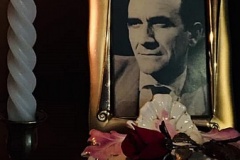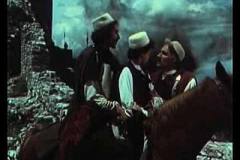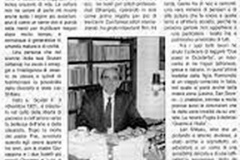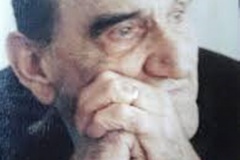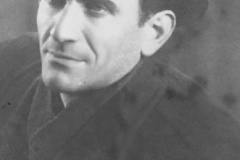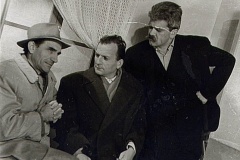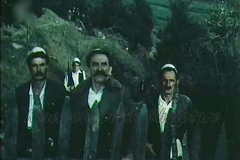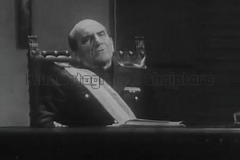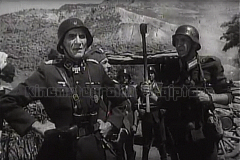Lec Shllaku (1921-2007)
Director, actor, writer. “People’s Artist” and “Honorary Citizen” of the city of Elbasan.
Shllaku worked as a director at the “Migjeni” Theater and later at “Skampa”, Elbasan. He was born in Shkodër on November 3, 1921. Leci was orphaned by his father when he was 4 years old. Together with his mother and two brothers, he grew up in the house of his uncle, who, although was a tailor by profession, had hobbies of the stage, dances, carnivals and sports.
“I felt a special inclination for the arts and sciences. At the head of the time when my inclinations were to be sifted, I was very reluctant to convince them what name my path would have. I wanted to become a good professional and achieve perfection. I was first introduced to theater and poetry by my uncle, a famous Shkodran stage actor and performer in the carnival”.
His artistic beginnings belong to the amateur theater, before and especially after the Second World War. From 1945 – 1949, he staged with amateurs, several successful pieces, where he engaged a number of amateur actors, who later became the core of the theater “Migjeni”, which was created in 1949. From this time, the pieces “Agimi “, “Avarice”, “Life Begins Again”, “Servant of Two Lords”, “The Tyrant of Padua”, etc., parts that had their own success, staged in the period 1945 – 1960. For one year, 1949 – 1950 Leci works at the Central Theater of the Army.

From 1951 to 1960, he worked at the theater of Shkodra, which until then was led by Andrea Skanjeti. In Shkodër, he works with well-known actors Zef Jubani, Tinka Kurti, Antonjeta Fishta, Lec Bushati, Vitore Nino, Preng Lkunda, Adem Kastrati. The fruit of this genius collaboration is the staging of “Kopraci” with the actor Zef Jubani in the main role.
Together with the other director of this theater “People’s Artist” Andrea Skanjeti, Lec Shllaku has merit in the consolidation of this theater, who gave him a national physiognomy and became the second most important theater in Albania, which for years created great value, and which successfully faced the national theater, or those of the districts.
 In 1962, by order of the ministry, he was commissioned to establish the theater of Elbasan. A work that he started from the beginning and for 8 years of tireless work as an author and director, he did a great directing job, created a successful troupe and raised this theater to the rank of the best national theaters. He has been described as the director who laid the solid foundation of a quality professional theater troupe.
In 1962, by order of the ministry, he was commissioned to establish the theater of Elbasan. A work that he started from the beginning and for 8 years of tireless work as an author and director, he did a great directing job, created a successful troupe and raised this theater to the rank of the best national theaters. He has been described as the director who laid the solid foundation of a quality professional theater troupe.
“In the post-war administration, the foreign authors, started appearing in our scenes relatively little as of late. In order to introduce them to the professional scene, a special commission was set up at the Ministry of Culture. This commission prepared the list of foreign authors and gave the green light only to those who were judged to be the most “educational”, the upper classes with exceptional rights, especially those of feudalism and capitalism, hit the critics more fiercely. Even when they were put on the selection scales for offering to the professional artistic communities of the provinces – these features should weigh much more heavily than their artistic values.”
There are 13 premieres, 10 dramas and 3 comedies, which gave him glory as a director. Among his most successful pieces, we mention the comedies “The Man Who Saw Death With Eyes”, “The Road of Zavalins”, the dramas: “Seven Shalians”, “The End of an Intrigue”, “Skënderbeu”, etc.
In the 60s and 70s, the stage of the Professional Theater was owned by several famous and great names such as Nazmi Bonjaku in Vlorë, Lec Shllaku in Elbasan, Kujtim Spahivogli in Tirana, Gjergj Vlashi in Durrës, Pirro Mani in Korça and then in Tirana, Serafin Fanko in Shkodër.
“Thus in 1962 I was sent to Elbasan, where I founded and directed the “Skampa” theater for ten years and where I was given the opportunity to see new horizons and get to know the realities that helped me a lot. I can’t help but remember the great actors Robert Ndrenika and Demir Hyskja, but I also remember the appreciation that Viktor Eftimiu gave to the actor Haxhi Sejko, when he watched the performance of “The Man Who Saw Death With His Eyes”: These actors and the theater ours in Romania doesn’t have them.”
In 1970, he left the “Skampa” theater and, surprisingly, he was not appointed to the “Migjeni” theater, but he was a teacher at the 8-year school in Koplik, with the idea of engaging the center of culture (?!), he stayed until he retired. , but who also engaged with the Institute of Shkodra, where he staged 11 theatrical pieces with them.


Lec Shllaku has been active in several films, mainly in negative roles: “Skënderbeu” (1953) in the role of Gjon Kastriot, “Triumph over death” (1967); “The Stars of Long Nights” (1972) as the officer Obersturmführer; “The Alleys the seeks sun” (1975) as the quaestor; “Bullets to Emperor” (1980) as the judge; “Autumn Reapproaches” (1981) as priest; “Road to freedom”(1982) as Gjelosh Marashi. In 1984 Shllaku took part in the film “Far from the Barbarians” by the Albanian-born director Liri Begeja.
After 1990, he dedicated himself to writing continued his activity, mainly in the field of letters. Since 1997, he emigrated to Athens, together with his sons, Primo (poet) and Bruno (actor of the theater “Migeni”), he was specially honored with the high title “People’s Artist”. He wrote with truth and passion the history of Shkodra`s Theater, Shllaku is the author of monographs dedicated to such figures of stage culture as Zef Jubani, Loro Kovaçi, Palokë Kurti, etc.,
Lec Shllaku is the author of several volumes of poetry and prose, even covering types of long works of these genres such as the poem “Norja and Nika” in 1995, “When Teater was born”, “Loro Kovaçi 1903-1966” (monograph), or the last novel “Story of a wounded”.
In the last 5 years, he published a total of 7 books, one of which, the travel impression book “Two Steps to the West” was published in Italian and Greek.
Lec Shllaku passed away on August 5, 2007, but left behind a name, left a work that has not yet found its appreciation. The name of Lec Shllaku is added to the prominent names of this family that have a valuable and extraordinary contribution to our national culture, add here also the great translator, Lec’s brother, Gjon Shllaku.
“Am I afraid of death? I am afraid of suffering, which I do not understand until the end, but I am not afraid of death, because it has a meaning, even a very big one. I don’t have any regrets left. I have never done projects that would have exceeded my powers. What helped me was writing some manuscripts and works when I was at home.
” Holds the highest title of “People’s Artist” and Honorary Citizen of Elbasan.
Filmography
Skënderbeu (film) – (1953)… Gjon Kastrioti
Triumph over death – (1967)….
The stars of the long nights – (1972)… Obersturmfyhrer
Alleys that seeks the sun – (1975)… Questor
Bullets to Emperor – (1980)… The judge
Autumn reapproaches- (1981)… The priest
The road to freedom – (1982)… Gjelosh Marashi
Loin des barbares – ( 1994)… Réfugiés Mourmelon
________
Albanian Cinematography in activity since 2013
Follow us: Blog: https://albaniancinematography.blogspot.com/ Vimeo: Albanian Cinematography (vimeo.com) Facebook: https://www.facebook.com/ksh.faqjazyrtare Dailymotion: https://www.dailymotion.com/kinetografiashqiptareartisporti YouTube: https://www.youtube.com/channel/UCDRYQ5xCyGkfELm3mX8Rhtw
Discover more from Albanian Cinematography - Sport
Subscribe to get the latest posts sent to your email.

